Topical authority is great for your rankings.
How do we know?
Simple: Google values expert-level content above all. And where does this content come from?
Credible sources, that’s where. Accomplished authorities and the websites they run. Their knowledge and expertise earned them the highest level of trust from users — and from search engines.
Is your site authoritative? Check your rankings >>>
What Is Topical Authority?
Topical authority shows how much of a credible authority an entity (person or website) is on their chosen subject. One can be an authority, or an expert, only in comparison to others.
In terms of SEO, it means having superior content and a stellar online reputation. Of course, these things are a result of long-term commitment to your work.
Let’s answer some questions about topical authority to shape the basic understanding:
Can Topical Authority Be Measured?
No. There are no tools to measure it (at least not yet). Right now, you can only watch out for signs like high rankings, high domain authority, Position 0 results and others.
Can Any Website Grow Its Topical Authority?
Yes, but there must be a dedicated person behind it. Sites like fan forums which rely on user-generated content and only serve to entertain don’t have what it takes to become an authority.
Do I Have To Build Topical Authority?
You don’t have to, per se. However, expert-level content reaps the highest SEO rewards: rankings, revenue, and reputation.
Are you motivated to compete with other experts? Then this path is for you.
In SEO, topical authority means having superior content and a stellar online reputation.
Step 1: Demonstrate Each Element Of E-E-A-T
First things first: how do you assert yourself as an authority on your chosen topic?
If you are familiar with the concept of E-E-A-T, you won’t be surprised that it’s closely tied to topical authority. Working on one is the same as working on the other. And E-E-A-T makes it very easy to understand what exactly you need to do.
What does E-E-A-T mean, and how do you demonstrate it?
- Experience: what you have personally dealt with as a person and a professional, and what you can share with your audience. Example: a detailed product review where you describe how you have used it.
- Expertise: a high level of skill and knowledge in your field. Example: a Knowledge Panel with an expert’s name, photo, credentials and contact information.
- Authoritativeness: earning the title of an expert by creating content and gaining rankings and backlinks over a long time. Example: being referred to as a credible source of information by another website.
- Trustworthiness: having a good reputation in the eyes of your target audience. Example: positive user reviews.
Each of these elements signals to Google that your website is run by a real pro who knows what the users want. This is your end goal in very simple terms; now it’s time for details.
Step 2: Stick To A Single Niche
Can you dedicate your site to multiple niches?
Sure. But as the saying goes, the person who chases two rabbits catches neither.
If your chosen niches are not closely related, then Google will not view you as a specialist. But if they are closely related, then it’s very much possible.
For example, TripAdvisor is a very well-known authority on all things related to travel: destinations, HoReCa, popular activities, and more.
If you want to be acknowledged as an expert, the best bet is to pick a single niche – and commit to it fully. But if you are feeling ambitious, then pick several related topics and start pumping out content like the Internet will shut down tomorrow.
Step 3: Start Gaining Experience & Never Stop
How do you get good at something? By doing it countless times, of course!
The more experience and knowledge you have, the more you can put into your content and show to your audience – and to Google. And the more you have to show, the more credible you appear in everyone’s eyes.
And don’t be afraid to make mistakes. A bad experience is also a valuable experience.
Step 4: Create Original, In-Depth Content – Lots Of It
Obviously, no expert steals other people’s work. Real stars create their own content and make it as good as they can.
Be original, be amazing, be productive – that’s pretty clear.
What else should you do to get the most out of your content?
- Update your outdated content. It’s easier and faster than writing a more up-to-date article from scratch. It’s also more correct from an SEO standpoint, as older pages have more authority than freshly made ones.
- Include links to other sources. The more authoritative they are, the better. It makes your own content look more credible too, since you clearly know the best sources.
- Fill your content with relevant keywords and phrases. Only your own experience can identify the best phrases to use, but WebCEO’s Keyword Suggestions tool is a great place to start looking.
- Promote your content. Social media and email outreach are your best options.
Also, quantity matters as much as quality. If you want to become a real authority, one or two articles won’t be enough no matter how great they are – you will need to make many more to cover your niche in full.
Step 5: Create Different Types Of Content
You may be sticking to one niche, but every niche can be presented in multiple formats.
Therefore, you should rely on more than just blog posts. What else is there?
- Podcasts.
- Graphs and diagrams.
- Case studies and research reports.
- Images (photos, infographics).
- Videos (including shorts, streams, webinars).
The more you can make, the better. However, it’s okay to focus on only a few types of content as long as you can make them excellent.
Step 6: Use An Efficient Internal Linking Structure
When one page links to another, it shares some of its own authority with it.
Interlink your site’s pages in an efficient way, and you will achieve two important goals:
- Your visitors will easily find any content they want.
- Your important pages will receive as much authority as possible.
Note that page authority is not the same as topical authority. But the two are still connected, and increasing one increases the other.
How Do I Create An Efficient Internal Link Structure?
As was mentioned before, you need to create lots of content to explore a niche in full.
Some of the pages you make will be closely related by covering different aspects of the same topic. Those pages can be grouped into a topic cluster.
What Is A Topic Cluster?
A topic cluster has (usually) one page with the main topic and several others with related topics. For example:
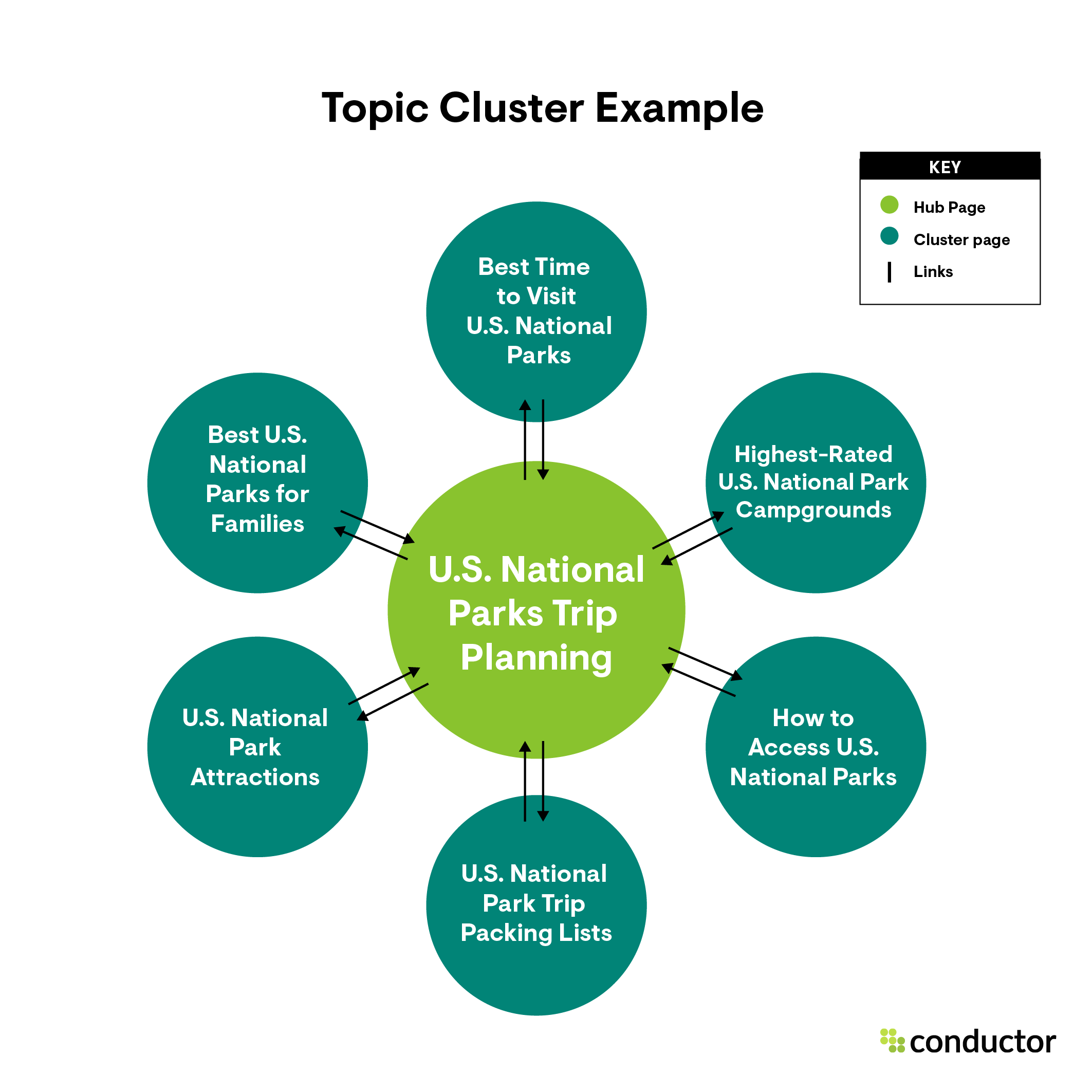 Screenshot from Conductor.com, April 2018
Screenshot from Conductor.com, April 2018The hub page has the most authority in the cluster and shares it with the rest, making them more visible in search, too.
So how do you maximize your page authority – and topical authority with it? For that, you need to know exactly how much authority your pages hold. Find out with WebCEO’s Internal Links tool.
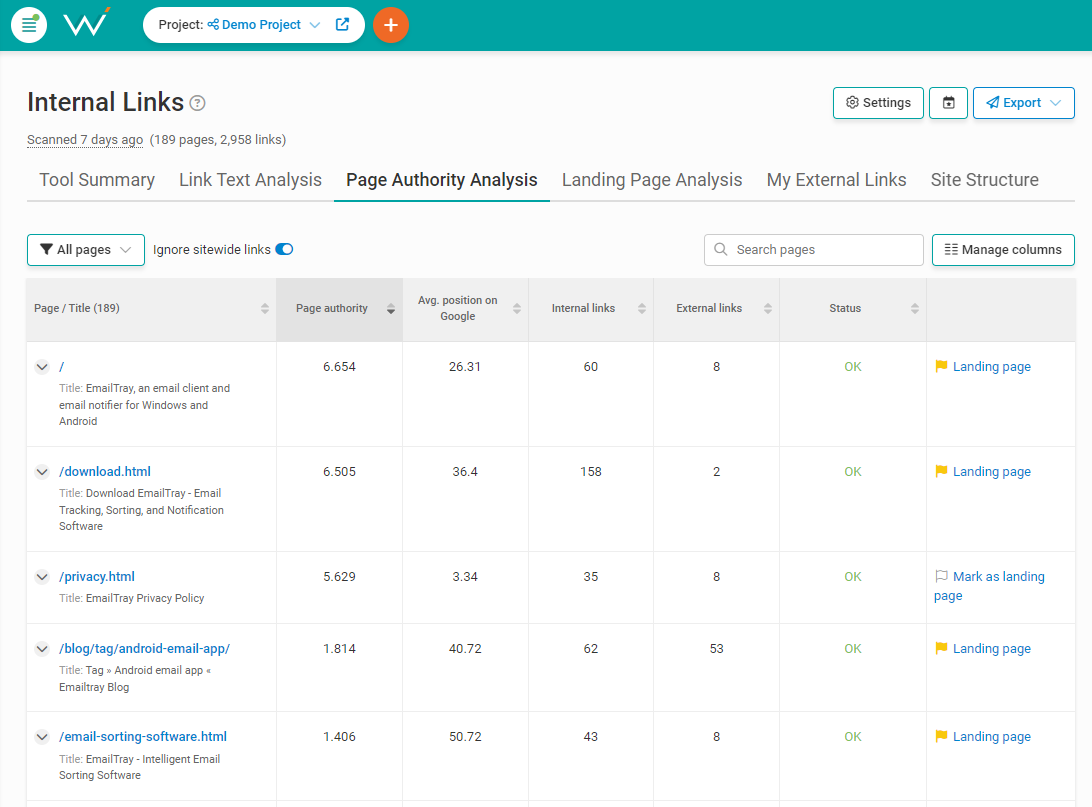 Screenshot from WebCEO, February 2024
Screenshot from WebCEO, February 2024Then build topic clusters around your most authoritative pages.
Step 7: Get Backlinks From Authoritative Sites
Remember about authoritativeness? That’s the A in E-E-A-T, and it’s one of the most time-consuming parts because it requires building links to your content – the toughest part of SEO.
But before anything else, you must find trusted sites whose backlinks will boost your authoritativeness. And the best way to do it is to see where your competitors are getting their backlinks.
Open WebCEO’s Competitor Backlink Spy.
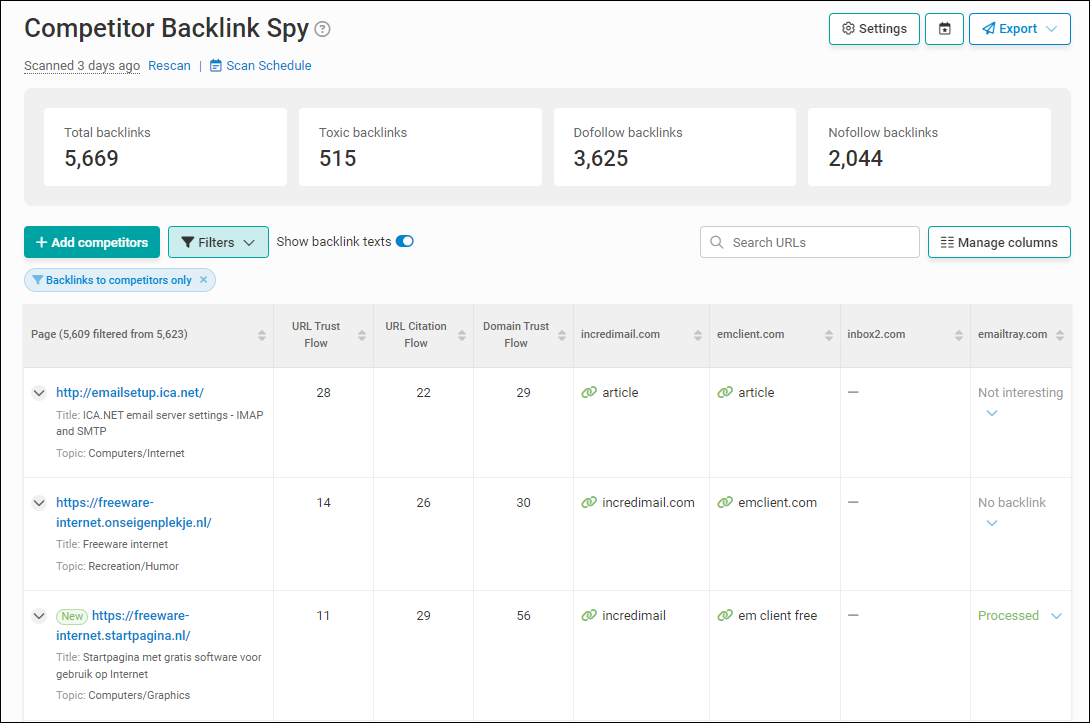 Screenshot from WebCEO, February 2024
Screenshot from WebCEO, February 2024Add your competitors’ sites in the Settings and press Save. The tool will generate a table with all of your competitors’ backlinks, with anchor texts and domain authority.
Ideally, you will want to build your own backlinks from the most authoritative sites. And yes, your competitors are fair game, too! Here are a few effective link building methods:
- Create content that’s likely to get backlinks. The best examples include case studies, research papers, and statistics – users love interesting data.
- Find unlinked mentions of your brand and turn them into backlinks.
- Find articles with outdated information on other sites. If they have links to outdated sources, offer to replace them with a link to your own, up-to-date source.
- Find broken links on other sites and offer a replacement from your own site.
- Collaborate with other specialists in your niche (e.g. via podcasts).
Step 8: Grow Your Online Reputation
Gaining clout requires transparency.
People and companies cannot become authorities by staying hidden in the shadows like the infamous hacker Anonymous. At the very least, you will need to attach a name and a face to your content – for example, in an author bio.
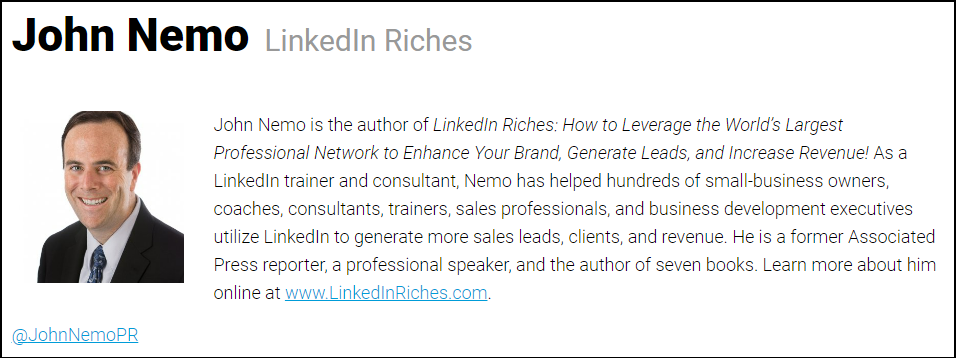 Screenshot from Inc.com
Screenshot from Inc.comThe more professional it looks, the better.
What else can you do?
- Get positive reviews from your users. Often, they leave a review if you simply ask. Don’t be discouraged by bad reviews – having a few of them makes you look more natural than having none at all.
- Create an About Us page. Describe your company and your experts, and feel more than free to brag about your successes.
- Create pages on social media. Ideally, you want a page for your company and a page for each of your experts on every social network where your presence makes sense. Of course, if you work solo, then all you need is a single page just for you. Don’t forget to link to your social media pages from your site.
- Engage with your followers on social media. Like their posts, follow them back when appropriate and, most importantly, reply to them as soon as possible. Setting up a chatbot can help you tremendously with the latter.
- Engage with your competitors in social media. Be active on their pages, and you just might end up stealing from them a client or two (or more).
Step 9: Create A Wikipedia Page
Wikipedia is a very well-known and trusted resource. Having a page there is a huge boost to any person or brand’s image – especially if the article is filled with detailed information.
Of course, you can only create a Wikipedia page about yourself as a person if you are already famous. Otherwise, your best bet is a page about your company.
Either way, you are going to need an auto-confirmed Wikipedia account – one that is at least 4 days old and has made at least 10 edits. After that, you can start making your page. Feel free to use other, similar pages as a basis.
And remember to include citations and sources from sites other than your own.
Step 10: Provide Excellent User Experience
And of course, a true expert’s website is expected to run flawlessly. Professionals have standards – and so do users who consult experts.
What can you do to make your site a welcoming place?
- Increase your loading speed. Find your slow-loading pages with WebCEO’s Speed Optimization tool and follow its recommendations for improving them.
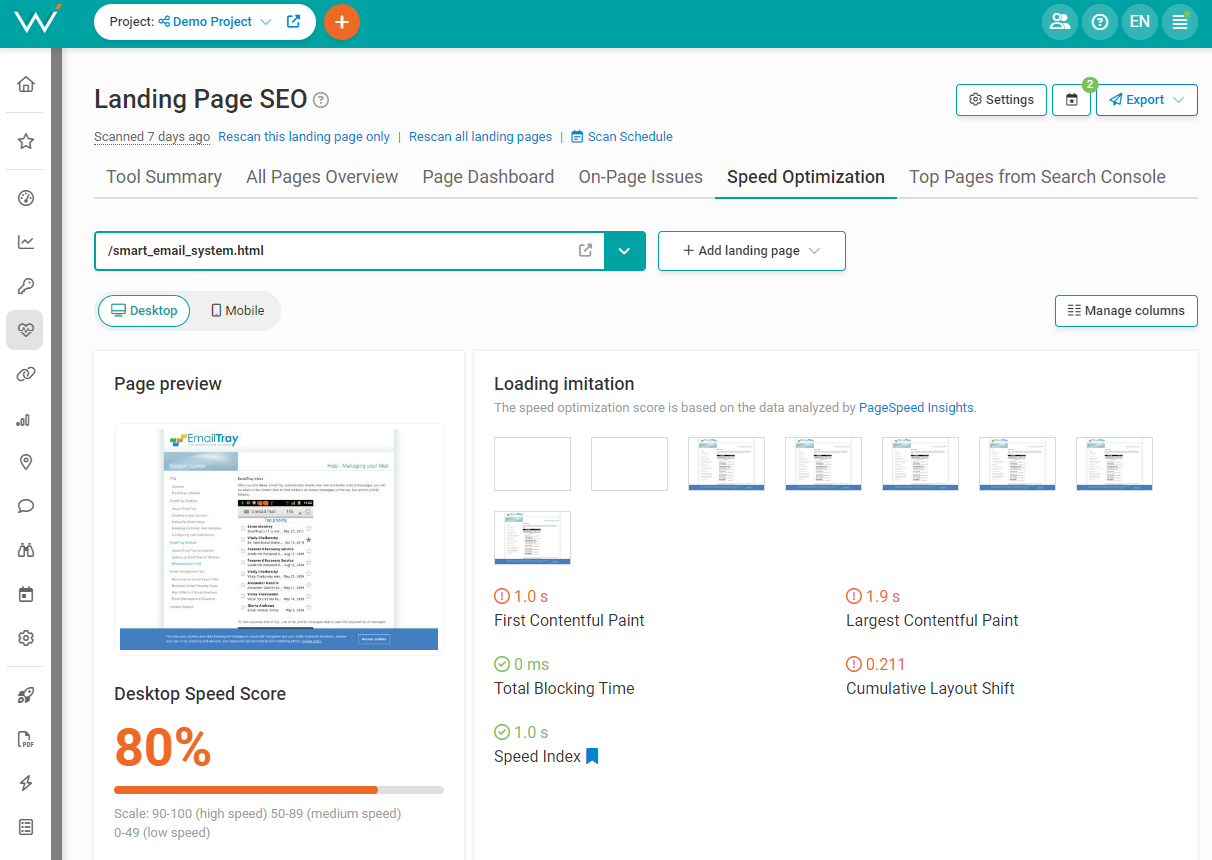 Screenshot from WebCEO, February 2024
Screenshot from WebCEO, February 2024- Ensure mobile-friendliness. Your site must be responsive and work well on all devices. In the same Speed Optimization tool, click the Mobile tab and see where your site is falling short.
- Fix technical errors. Find all errors on your site with the Technical Audit tool and fix them promptly.
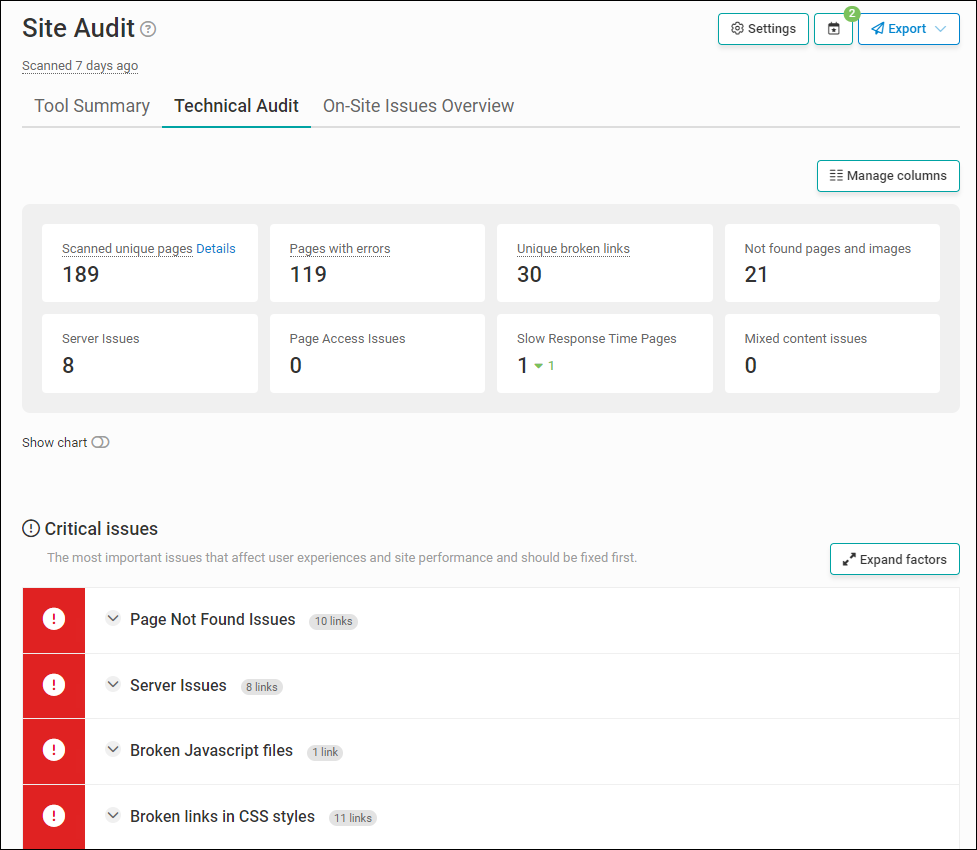 Screenshot from WebCEO, February 2024
Screenshot from WebCEO, February 2024- Translate your content into multiple languages. If you are after a multilingual audience, this is a must.
- Ensure user accessibility. Make sure all kinds of visitors can use your site, not just healthy ones. Use a tool like ARIA by EquallyAI to see what sort of additions your site needs.
Wrapping Up
If you set the goal to become an expert in your field, then gaining topical authority will be a natural part of the process. It will take years of hard, prolific work; it’s your choice whether to commit or not. But the reward for this choice is acknowledgment in your community and in search engines.
Take the first step on this long road. Arm yourself with SEO tools that will help your content reach the top rankings faster.
The opinions expressed in this article are the sponsor's own.



